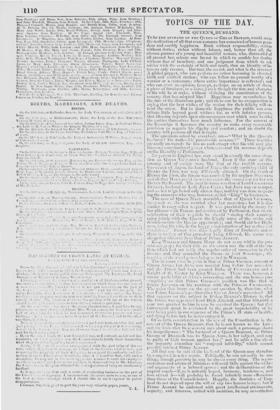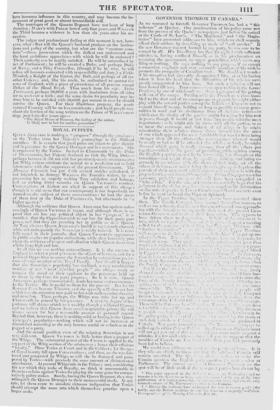TOPICS OF Ti} DAY.
THE QUEEN'S.I.FUSBAND.
To be TI1E HUSBAND Or THE QUEEN or GREAT BRITAIN, would seeIR the realization of all that even romance has conceived of human gran- deur and earthly happiness. Rank without responsibility, station without duties, riches without labour' and, better than all, the chosen partner of a young and beautiful woman, who, distrustful of all around her, selects one breast in which to confide her doubts without fear of treachery, and one judgment from which tr.) ask advice with the certainty of faith and truth, that an identity of in. terests only creates. But turn the medal, and what is the reverse? A gilded puppet, who can perform no action becoming in elevated birth and exalted station. ' who can follow no pursuit worthy of a warrior or a statesman; whose entire importance is reflected; and
who can avow no opinion (cNccpt, perhaps, ott an article of dress, . a piece of fitrni(ure, or a Lrse,) even though the lift and character otitis wife be at stake, without violating the constitution of the country that has adopted him! Happiness may nevertheless be the fate of the illustrious pair ; and there ean be no exaggeration in saying that the best tvislics of the nation for their felicity will at. tend the union. But to domestic happiness the public can con-
tribute little beyond good wishes ; I'or, as with inferior persons, that blessing depends upon circumstances over which none besides the parties themselves have much influence. For the consort of the S,,vereign it becomes the country to make every reasonable provision as regards his dignity and comfort ; and no doubt the country will perform all that it ought.
The questions asked by everybody are—" What is the Queoll'S
it 111S rank—his power—his teulltle These iuquiries are easily answered: he has no rank eNcept what his wife: may give him—ro constitutional power whatever—and his revenue depends
on the lib( rality • No person in Enghthei has ever stood in exactly the same situa- tion as Queen Ynsismes's hus.band. Even if the state of this country and of socit ty true like that of the twelfth century, Cuorrauy of Anjou, hu,hand of 3 the (.nlv surviving Child of ilnNay the Tirst, was very difll rently situated. On the death of IIENwr the First, the throne was usurp(11 by his nephew STErnrN; and all that '1 AID COuld to :A..eure the succession for her son 111:NRY Stcond. The next instance was that of Lord Cr Loroap Duusny, basi•and of Lade C NET ; but JANE was an usurper, and ;,s her reign laited only eleven days, nothing was done respect- ing the consort—who was, however, styled "King " by foreincrs.
The ease of Queen I Ally resembles that of' Queen l'14:TtinIt, he was inatTied after her accession ; but it is dis- similar in every other rLspeet. It WT,S provided by the treaty for her alliance with Powe, and eonlirmed by Parliament, that On the celebration of their he should " during their marriage enjoy jointly with the Queen the Kingly name of the realm and dominii.ns unto the Queen appertainh.g. and should aid hi .r 11i.411- ness, beimg his wife, in the lati‘py a;ImiListration of her realms and
Iii 1.11' Vas tlt 1(.g;t1ly King of Englaud ; and as
there is no fear of that precede-Lt heit:g followed, his status was tdrogetla:r did:Tent front that of Prince Ar.marr.
K:14 WILLIAM and QtleCII nun- do not come within the pre• St It cute ; for their title to the crown was the will of the na- tion, Which had set n; Lie the regular order of succession in their fee our ; and they ascended the throne as joint Sovereigns, the
e::krei.:c adv.! royal 1:ower veAed in WILLIAm. The instance Isest in point is that of Prince GEORGE, consort of
Queen ANNE; Ltd Assn was married long before her accession, and the Prince had la en created Duke of Custtaatt.s i i Mill a Enight of ill: (;;,.rter by King Wit.m:s.m. There was, howe% et., It 541-cllg pr,ALLiiity of A NN ifs succeeding, and she was heiress pre-
. emvive ; at that Prince C notion's position was like that of Psinec 1,110ao1.11 on his marriage with the Princess Citstmorra. This: point that bears en the present question is, therefbre, what vas Peittee Csonon's pesition after Queen ANNE'S accession ? All that appears on the subeet in it;shop Bramsr's Ilistory isohat the Prince itliS appointed Lord Did: Admiral, and that 100,G00/. a year was granted to hint in case lie smvived the Queen : but that extravaFant grant is esplained by the great improbability of its ever besug paid, in consequence of the Prince's ill state of health; and dying before her, he never enjoyed it. Of Sc,, little consideration in the, eve of' the Constitution is the consort of the Queen Regnant, that he is not known to the Law ; and the little that lii.ACKSThNi: SaVS about such a personage sl:ows his insignificance : "The' husband of a Queen Regnant, as Prince George of' Denmark was to Queen Anne, is her subject, and may
, be guilty of' high, treason against her ;" and Ile adds a line about the impunity attending his " conjugal infidelity," which cannot , possibly interest Prince;..M.nrier. All that can be said of the las,tand of the Queen may therefbre , ic comprised in a few words. Politically, Ite elm mtensibly be no- thing ; though prirately he may be almost every thing. The sepses
sentedioos and skim of :Ministers will avail little against the wishes • ' and arguments of a beloved sponse ; and the deliberations of the
nuptial couch—if, as is ardently hoped, harmony, tenderness, and love attend it—will probably be fbund infinitjl'y more efficacious than those of the Council-board. Happily, the destinies or Eng- land do not depend upon the will of any two human beings; but if Prince ALBERT be endowed with great intellectual attainments, sagacity, and firmness, united with ambition, he may nevertheless
have immense influence in this country, and may become the in- strument of great good or almost irremediable evil.
The marriages of the Queens Regnant have not been of long duration : ARY'S with Pulsar lasted only four years, and 'WILLIAM the Third became a widower in less than six years after his ac- cession.
The vulgar and predominant feeling at this moment is not, how- ever, what effect will the Queen's husband produce on the institu- tions and policy of the country, but what arc the " creature com- forts"—those possessions which the dullest can understand and the least ambitious appreciate—with which be will be endowed? Their curiosity cati be readily satisfied. lie will be naturalized by act of Parliament ; he will be created a Duke, and perhaps Duke of Misr, mid a Privy Counsellor, (though if be be wise, lie will refuse all honours connected with responsibility and duty,) a Field- Marshal a Knight of the Garter, the Bath, and perhaps of all the other Orders ; and, like his uncle, be authorized to quarter tile arms of England, with a grant of precedence of all persons except Dukes of the Blood Royal. Thus much from his wijia From Pariihmelli, peehaps 30,0001. a year, with laudations from all sides for so moth rote a wish ; and the same desire for popularity may in- duce him to be satisfied with 50,000/. per annum in case he should survive the Queen. For their illustrious progeny. the good- natured Country svill be no less considerate ; and loyal people mav chant the burden or the song written on the Prince of WALcs's mar- riage just flirty-five years ago- ,. The Royal Ilonse of Ilitnover, the darling of the nation, is likely now to last 14 another generation:"



























 Previous page
Previous page